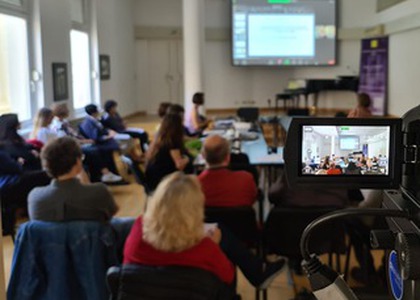> [Archived] Events

The International Musicology Symposium of the International New Music Week Festival 2023
On Friday, May 26th, the New Europe College of Bucharest hosted the International Musicology Symposium at the International New Music Week Festival, organized by Professor dr.h.c. Valentina Sandu-Dediu, rector of the New Europe College and professor at the National University of MusicBucharest. The topics of the lectures and discussions were very tender, centered around the points of compositional convergence between Germany and Romania.
Musicologists from Germany, the United States and Romania participated: Dörte Schmidt (University of Arts in Berlin), Michael Heinemann (Dresden Music Academy), Joseph Cadagin (scholar of the New EuropeCollege), Valentina Sandu-Dediu (New Europe College, UNMB), Olguța Lupu (UNMB), Florinela Popa (UNMB), Vlad Văidean (UNMB) and Andreea Kiseleff (Radio România Muzical, UNMB).
At the end of this communication session, I spoke with Joseph Cadagin and Valentina Sandu-Dediu:
Joseph Cadagin: I really liked the idea of the symposium, a theme that connected all the presentations and at the same time offered us the possibility of various approaches. For example, I was referring to a German author and a Hungarian composer, that was inspired by Romanian music. I am American, but it was a pleasure for me to observe the construction of bridges between the mentioned cultures. I was delighted to learn more about the creation of Romanian composers, who are lesser known in the United States, although I had the opportunity to listen there to Dan Dediu's music once and write a chronicle. Even Enescu's music is not well known. I think it was a wonderful opportunity to "spread the word" about Romanian music.
Valentina Sandu-Dediu: I was very interested and I was very happy that exceptional colleagues from Germanycould participate, Michael Heinemann from Dresden, Dörte Schmidt from Berlin, the latter being only online, but everything worked very well. Also, the fact that we had Joe Cadagin, who is my young colleague from NEC and to whom I foresee an absolutely brilliant career, not only in Ligeti's research. Moreover, I had young colleagues around, which was a great pleasure, because I saw professionalism, seriousness and at the same time I noticed the science of communicating, to say important and joyful things to the public who, of course, was limited, made up of specialists. The conclusion would be that ... there is no conclusion, because these compositional bridges between Germany and Romania represent research that still has a great potential to be explored. And we want to do it. In any case, I aim to record these contributions in Romanian and in an international language of circulation and see where the future takes us. It is fascinating that some leitmotifs were created: the music classes at Darmstadt, held byGyöry Ligeti, which was natural to become a leitmotif, because we are in the centenary year Ligeti and I think we, Romanian musicologists must honor him better than we have done so far. Small and large laitmotives were created that connected us to a network in a spontaneous manner, not only in an organized one. The founder of this Festival, Ștefan Niculescu was inevitably present among us and I am glad that, for example, the last three works showed, without declaring, a lineage of generations and schools between George Enescu, Ștefan Niculescu and Dan Dediu, who was a student of Niculescu.
Translated by Bogdan-Nicolae Tănăsescu,
University of Bucharest, Faculty of Foreign Languages and Literatures, MTTLC, year I
Corrected by Silvia Petrescu














